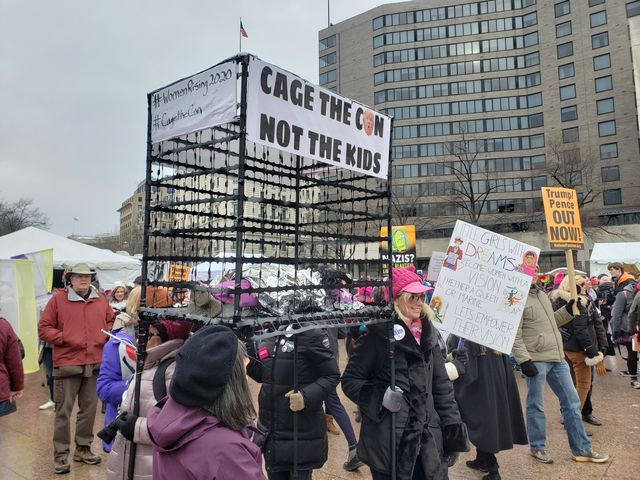This past Saturday, in Washington, D.C. and other cities across the world, marked the fourth annual Women’s March, which began after Trump was elected as President in 2016. Crowds and coverage of the event were significantly smaller than the previous marches, which could have been because of the snow or, more likely, because of the criticism that the organization has faced with its lack of diversity. Speakers and leaders of the event have notably been mainly cis, white, middle-class women (such as Gloria Steinem, Scarlett Johansson, Ashley Judd, and Nancy Pelosi). Recently, a few of the founding members stepped down from their positions due to accusations of antisemitism.
There was some change in mood, in regards to inclusivity this year, even with the smaller turn-outs. One woman, who was attending her first march, told NPR, “The Women’s March has had a history of marginalizing certain people. They want their version of smashing patriarchy to look a certain way. I’m Black, I’m proud. This is my march as much as it is any other person’s march.”
Chilean activist group Las Tesis chanted with others among the crowd outside the White House to the now-viral anthem “Un Violador En Tu Camino” (“A Rapist In Your Path”), while some shouted the section of impeachment from constitution due to Trump’s latest unfolding drama.
That said, marginalized women are still not fairly represented in the marches—despite them facing bigger threats than white women. Even scrolling through the top tagged photos, tweets and hashtags it shows that most of the coverage remains unbalanced. For this piece, I searched for photographed disabled women at the marches and found little (in the past, the march has been called out for their lack of accessibility). The three main issues the march focused on this year were: Climate Change, Reproductive Rights and Gun Violence. All of which will heavily affect Indigenous, Black, immigrant, low-income, LGBTQ+, and disabled women the most.
So, to celebrate the march, the diversity in signs and individuals that participated, and the resilience of those that braved the weather, here are some of the best moments in pictures:
LasTesis Marched
“If feminism isn’t intersectional, it’s not feminism.”
Starting ‘Em Young
Gays Against Trump, Inequality, and Guns!
Marching For All The Black Women
Loving all these signs! ???#WomensMarch. pic.twitter.com/nU6bB7f0AW
— Planned Parenthood Action (@PPact) January 18, 2020
Trans Artist Performs Outside of The White House
Las Tesis Again. This Time, Drumming
A Marcher Reminds Us Of The Not-So-Long-Ago Past
Bringing To Light The Higher Risks Associated With Minorities
From Texas, With Love
Drag QUEEN Brita Filter Battles Trump And The Cold
Disabled Women Unite!
Native Women Marched For The Many Missing And Murdered Women Of Their Communities
“84% of Native women have experienced violence in their lifetime”
While Some Were Bundled Up In The North, In L.A. The Sun And Outfits Were Shining
They Marched AND They Danced
Jewish Women Shouting Out Congresswoman Ilahn Omar
Martin Luther King III’s Wife Andrea Spoke At The March
ARNDREA TODAY AT THE WOMEN’S MARCH — “The Beloved Community: a society based on justice, equal opportunity and love of one’s fellow human beings; where black mothers are not afraid for their children and the immigrant mother’s child is sleeping in a crib not a cage.” #womensmarch pic.twitter.com/6WNVbFDevh
— Martin Luther King III (@OfficialMLK3) January 18, 2020
A Simple Yet Strong Message
Sticking To Inclusiveness, Let’s Not Forget These Guys
Hi from the San Antonio #WomensMarch2020 pic.twitter.com/OJjumQO4TQ
— Mohona Chowdhury (@_mohona) January 18, 2020
Header image courtesy of Amy Pethers
More from BUST
This Is My 3-Year-Old Daughter’s Fourth Women’s March — Why This Matters
Watch 100 Women Protest At Harvey Weinstein Rape Trial
What You Need To Know For The 2020 Women’s March


